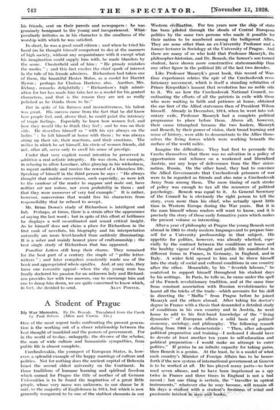A Student of Prague
My War Memoirs. By Dr. Benesh. Translated from the Czech by Paul Solver. (Allen and Unwin. 218.) ONE of the most urgent tasks confronting the present genera- tion is the working out of a closer relationship between the best thought of mankind and the powers of government. For in the world of to-day, unhappily, the divorce of the scholar; the man of wide culture and humanistic sympathies, from public life is almost complete.
Czechoslovakia, the youngest of European States, is, how- ever, a splendid example of the happy marriage of culture and politics. Not for nothing does the ancient capital of Bohemia boast the second oldest university on the Continent. In those traditions of humane learning and spiritual freedom which earned for Prague the title of mother of all German Universities is to be found the inspiration of a great little piople, whose very name was unknown. to our shame be it said, to the majority of Englishmen in 1914, but which is now generally recognized to be one of the stablest elements in our Western civilization. For ten years now the ship of state has been :7pilotred through the shoals of Central European politics by the same two persons who made it possible for their nation to be numbered among the belligerent Allies. They are none other than an ex-University Professor and a former lecturer in Sociology at the University of Prague. And there are many of us who hold that Professor Masaryk, the philosopher-historian, and Dr. Benesh, the farmer's son-turned student, have shown more constructive statesmanship than any other figure in the political life of the last two decades.
Like Professor Masaryk's great book, this record of War- time experience's relates the epic of the _Czechoslovak revo- lutionary movement, which is itself a standing refutation of Prince Kiopotkin's lament that revolution has no noble side to it. We see how the Czechoslovak National Council, co- ordinating the efforts of all the patriots in exile with those who were waiting in faith and patience at home, obtained the ear first of the Allied statesmen then of President Wilson himself. Already in December, 1914, when he went into vol- untary exile, Professor Masaryk had a complete political programme to place before them. Above all, however, their cause triumphed because the two leaders, Masaryk and Benesh, by their power of vision, their broad learning and sense of history, were able to demonstrate to the Allies them- selves the living forces which were working beneath the surface of the world melee.
Imagine the difficulties. They had first to persuade the Czechs themselves that there was no salvation in a policy of opportunism and reliance on a weakened and liberalized Austria, nor any hope of deliverance from the Slav sister- nation, Russia. On the other hand, they had to convince the Allied Governments that Czechoslovak prisoners of war were to be regarded as friends and also raise a Czechoslovak Army from among them. The mere timing of each stroke of policy was enough to tax all the resources of political psychology. Benesh was equal to it. As General Secretary of the Council he is obviously the right person to tell the story, even more than his chief, who actually spent little time in Western Europe during the War years. But it is the man himself whom readers will want to know, and it is precisely the story of those early formative years which makes the present volume so interesting.
After a year of philosophy at Prague the young Benesh went abroad in 1905 to study modern languages and to prepare him- self for a University professorship in that subject. His appetite for politics, however, was already whetted, espe- cially by the contrast between the conditions at home and the healthy vigour of thought and public life manifested in different forms in France. in Germany, in England, and in Italy. A wider field opened to him and he threw himself into the study of social and cultural conditions in one country after the other. Meanwhile, by his " feverish labours," he contrived to support himself throughout his student days by his writings. In Paris, he tells us, he came under the spell of the French revolutionary tradition, and at the same time from constant association with Russian revolutionaries he learnt all the tricks of the trade—which accounts for his skill in directing the " Maffia " from Prague before he joined Masaryk and the others abroad. After taking his doctor's degree in France with a thesis that demanded a detailed study of conditions in his own country and in Austria, he went home to add to his first-hand knowledge of the " living dynamics " of European. affairs a solid basis of political economy, sociology, and philosophy. The following remark dating from 1908 is characteristic : " Then, after adequate political preparation and training—I reckoned I should have to devote at least another ten years to self-education and political preparation—I would make an attempt to enter politics." If genius be an infinite capacity for taking pains, then Benesh is a genius. At the least, he is a model of what each country's Minister of Foreign Affairs has to be hence- forth if the new system of international government at Geneva is to be worked at all. He has played many parts—to have used seven aliases, and to have been imprisoned as a spy twice in France and three times in England is not a bad record : but one thing is certain, the " traveller in optical instruments," whatever else he may become, will remain all his days a student with a student's freshness 6f" mind and passionate inteiestIntienTaicaliooki.'"






































 Previous page
Previous page